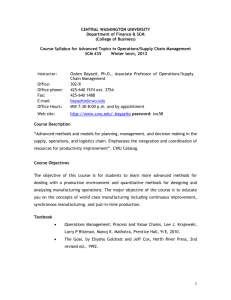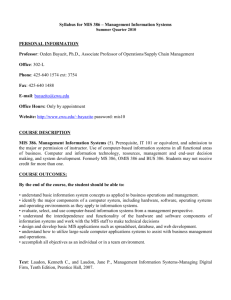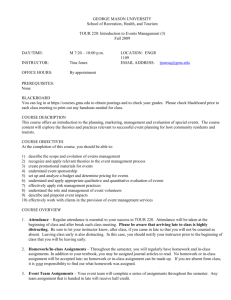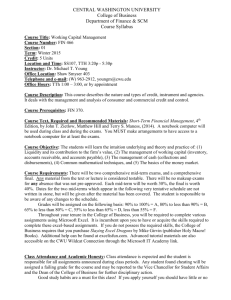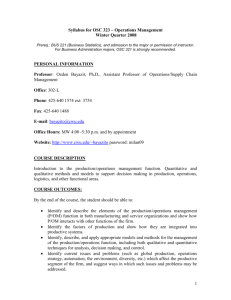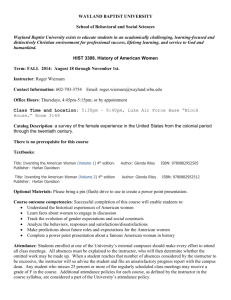Syllabus
advertisement
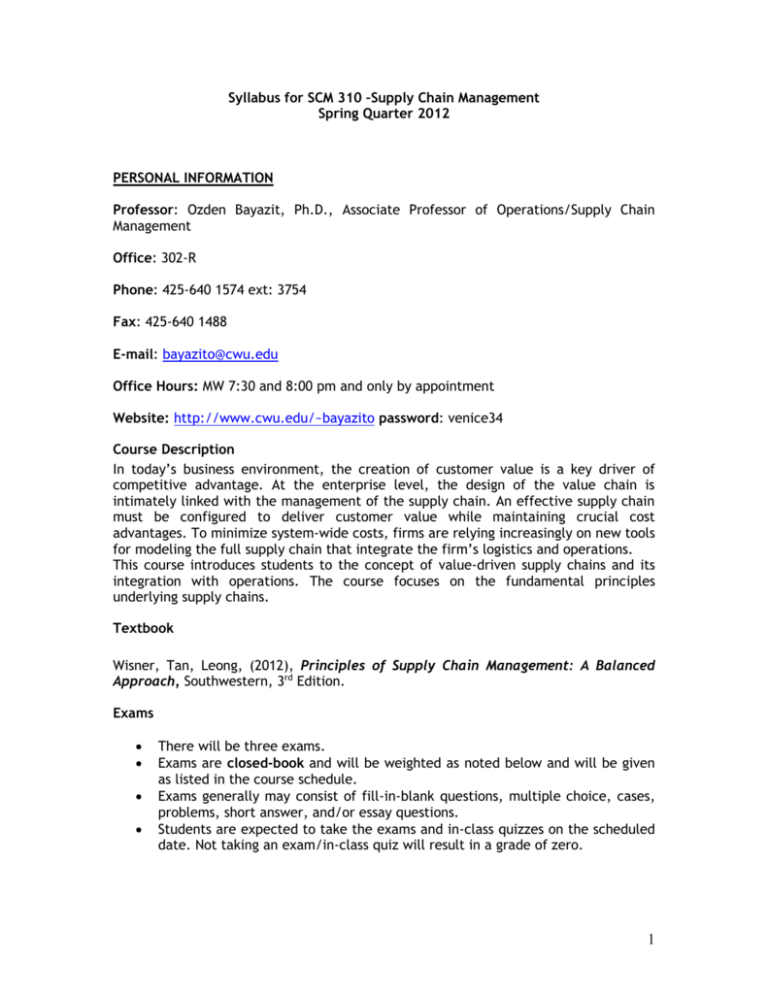
Syllabus for SCM 310 –Supply Chain Management Spring Quarter 2012 PERSONAL INFORMATION Professor: Ozden Bayazit, Ph.D., Associate Professor of Operations/Supply Chain Management Office: 302-R Phone: 425-640 1574 ext: 3754 Fax: 425-640 1488 E-mail: bayazito@cwu.edu Office Hours: MW 7:30 and 8:00 pm and only by appointment Website: http://www.cwu.edu/~bayazito password: venice34 Course Description In today’s business environment, the creation of customer value is a key driver of competitive advantage. At the enterprise level, the design of the value chain is intimately linked with the management of the supply chain. An effective supply chain must be configured to deliver customer value while maintaining crucial cost advantages. To minimize system-wide costs, firms are relying increasingly on new tools for modeling the full supply chain that integrate the firm’s logistics and operations. This course introduces students to the concept of value-driven supply chains and its integration with operations. The course focuses on the fundamental principles underlying supply chains. Textbook Wisner, Tan, Leong, (2012), Principles of Supply Chain Management: A Balanced Approach, Southwestern, 3rd Edition. Exams There will be three exams. Exams are closed-book and will be weighted as noted below and will be given as listed in the course schedule. Exams generally may consist of fill-in-blank questions, multiple choice, cases, problems, short answer, and/or essay questions. Students are expected to take the exams and in-class quizzes on the scheduled date. Not taking an exam/in-class quiz will result in a grade of zero. 1 If a student is unable to be present in class when an exam/in-class quiz is scheduled because of an emergency situation, it is the student’s responsibility to contact the instructor to arrange a new date for the exam. Otherwise no makeup tests will be scheduled. Final grade allocation: Exams (20% each): In-class quizzes (3% each): 60% 9% Term Paper: 15% Homework assignments: 11% Participation+ Attendance 5% 93% - A (4.0)/ 90% - A- (3.7) 87% - B+ (3.3)/ 83% - B (3.0)/ 80% - B- (2.7) 77% - C+ (2.3)/ 73% - C (2.0)/ 70% - C- (1.7) 67% - D+ (1.3)/ 63% - D (1.0)/ 60% - D- (0.7)/ below 60% - F (0.0) Student Responsibilities The student is responsible for all assigned readings and internalizing all the material presented in class, which may or may not originate from the textbook. The student is responsible for the material covered in the lectures, assigned textbook readings, guest lectures, and case studies examined in class. Participation and Attendance Students who do not attend lectures cannot get participation points (and attendance credit as appropriate) during that class period. All requests for excused absence must be in advance. The instructor may deduct up to 25 percent from the attendance and participation portion of a grade for each incident. Assignments The student is responsible for submitting the individual/group assignments when scheduled by the instructor. All assignments must be typed (no hand written) unless math calculations are required, in which case they may be hand written. Student/group name, submission date, and title of the homework subject should be included. When a group project is assigned, each group is required to return one written report to the instructor. 2 Assignments turned in up to two days late can receive up to a maximum of 50% of points. No points will be available after this time period. TERM PAPER (TEAMWORK) The paper will consist of a study of the supply chain management strategy employed by a firm of your choosing. You will be expected to visit a company and to inquire about its supply chain operations, to write about those operations, and to provide recommendations on how the operations might be improved. You are encouraged to work as a group of three students. The discussion depends on the type of firm chosen but should include key aspects of the firm's supply chain strategy, for example customer service, logistics, procurement, supplier relationships, inventory management, forecasting, return management, etc. Each group will be responsible for submitting a written report of the results. You are also expected to make a short oral presentation (10-15 minutes) (PPT slides are required for the presentation) of your results. Each person on your team must present, equitable allocation of speaking between team members is expected but not measured. Grading for Project will be based on the following: Written analysis (70%) and Presentation (30%). The maximum length of paper is twelve pages (double-spaced), although appendices may be included on additional pages. Due date for the paper is May 30th. Academic Integrity Central Washington University is a community of scholars committed to developing educated persons who accept the responsibility to practice personal and academic integrity. You are responsible for knowing and following the university’s policies toward student rights and responsibilities. They are documented in the Student Academic Integrity Policies and Procedures presented in the student catalog Appendix B (http://catalog.cwu.acalog.com/content.php?catoid=21&navoid=465). Any student participating in any form of academic dishonesty will be subject to sanctions as described in this policy. Students should furthermore abide by the following College of Business Honor Code: As College of Business students we pledge to uphold these standards of professionalism and conduct ourselves in accordance with them. We will not lie, cheat, or steal, and will not tolerate those who do. Our behavior defines who we are and what we will become. Services Available for Physically Challenged Students If you are physically challenged, please notify the instructor. The instructor and CWU will do their best to provide such services. 3 Tentative Course Outline: (subject to change during the quarter) Session Date of 1 03/28/2012 2 04/02/2012 04/04/2012 3 4 Chapter (s) Introduction to the class Chapter 1: Introduction to Supply Chain Management Chapter 2: Purchasing and Supply Management 04/09/2012 Chapter 3: Creating and Managing Supplier Relationships 5 04/11/2012 Chapter 4: Strategic Sourcing for Successful Supply Chain Management In-class quiz 1 (Chapters 1, 2, 3, 4) 6 04/16/2012 Exam 1 (Chapters 1, 2, 3, 4) 7 04/18/2012 Chapter 5: Demand Forecasting 04/23/2012 8 9 04/25/2012 10 04/30/2012 11 05/02/2012 Chapter 6: Resource Planning Systems Chapter 7: Inventory Management Chapter 8: Process Management: Lean Production and Six Sigma Quality Issues in Supply Chain Management Chapter 8: Process Management: Lean Production and Six Sigma Quality Issues in Supply Chain Management (cont’d) In-class quiz 2 (Chapters 5, 6, 7, 8) Exam 2 (Chapters 5, 6, 7, 8) Chapter 9: Domestic and International Logistics 12 05/07/2012 13 05/09/2012 14 05/14/2012 Chapter 10: Customer Relationship Management 15 05/16/2012 16 17 05/21/2012 05/23/2012 Chapter 11: Global Location Decisions In-class quiz 3 (Chapters 9, 10, 11) Guest Speaker Group project study time 18 05/28/2012 No class-Memorial Day Holiday 19 20 05/30/2012 06/04/2012 Presentations No classes 21 06/06/2012 Exam 3 (Chapters 9, 10, 11) 4
